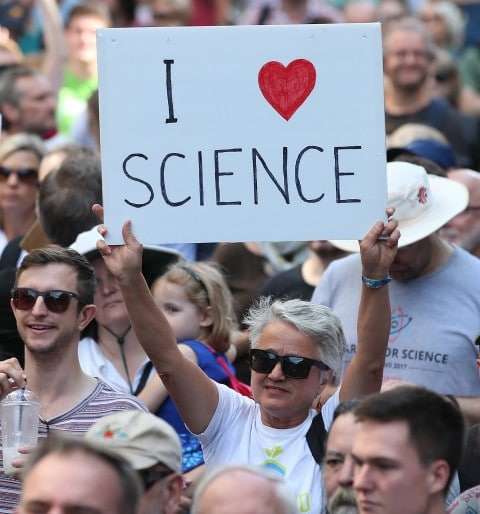The Volokh Conspiracy
Mostly law professors | Sometimes contrarian | Often libertarian | Always independent
When should voters march to the beat of scientists?

Today's March for Science protests are at least in part motivated by concerns that the Trump Administration is ignoring scientific expertise. The protesting scientists and their supporters hope to persuade the public to put more faith in the views of the scientific community and elect politicians who will do the same. This raises the question of the extent to which voter deference to scientists' views is in fact a good idea. I wrote a detailed post about this very issue back in 2015. And it seems even more relevant today than back then:
A recent Pew Research Center study shows that scientists and the general public disagree on a wide range of science-related public policy issues. For example, the survey finds that 87 percent of scientists, but only 37 percent of the general public believe that it is safe to eat genetically modified foods…. Relative to the public, scientists are much more supportive of nuclear power and the use of animals in scientific research, and much less supportive of offshore drilling. Also, some 87 percent of scientists believe that climate change is mostly due to human activity, a view shared by only 50 percent of the public…
Given my research on political ignorance, it is tempting for me to conclude that the answer is almost always "yes." The majority of the public is often ignorant about basic facts about government and politics, and their scientific knowledge is also far from impressive. You don't have to believe that scientists are always right about scientific issues to conclude that they are on average more likely to be right than generally ignorant voters are….
The above reasoning has some merit. But it is important to avoid conflating two different kinds of "scientific" issues. Some of the questions addressed in the Pew survey are almost purely technical questions. For example, the issue of whether GMO foods or foods treated with pesticides are safe, or the issue of whether human activity is the main cause of climate change. On these sorts of technical matters, scientists are indeed likely to know much more than most ordinary people, and there is a good case for deferring to them. But some seemingly scientific policy issues actually include major nontechnical components on which scientists are not likely to have specialized knowledge….
Some of the questions raised in the Pew study are actually mixed questions of scientific facts and moral values. For example, the issue of whether animals should be used in scientific research partly depends on the scientific benefits of using them - a question on which scientists have special expertise. But it also depends on the moral status of the animals in question…
Other issues on the survey raise questions of political economy rather than pure science. For example, many more scientists (82 percent) than ordinary people (59 percent) believe that growing population will be a "major" problem in the future. Whether it will be or not depends largely on whether the possible costs of population growth (e.g. - environmental externalities) will outweigh the benefits, such as increased innovation and a greater division of labor. On these latter questions, economists are likely to be more expert than natural scientists are, and economists tend to be much more skeptical of Malthusian arguments than either natural scientists or the general population….
In sum, it makes good sense to defer to the views of experts on areas that are actually within their expertise. But not on questions that may seem related, but actually are distinct. Telling the difference isn't always easy. Here, as elsewhere, being a responsible, well-informed voter turns out to be a lot harder than we might think.
The original 2015 post includes many additional details and qualifications, such as a discussion of how to deal with claims that scientists' views should be discounted because they may be biased by ideology or self-interest.
It is also important to remember that the tendency to dismiss scientific evidence inimical to one's preconceptions is not limited to any one side of the political spectrum. Both left and right often reject the scientific consensus when it cuts against their preconceptions. Global warming (which scientists overwhelmingly believe is caused by human activity) is a good example on the right, and perceptions of GMO foods (which experts overwhelmingly believe to be safe) are a notable example on the left. Partisan and ideological bias in assessing political issues are ubiquitous problems.
Some might think that deferring to expert opinion is never justified. We should instead evaluate the relevant evidence for ourselves. But, given limitations of time, energy, and knowledge, some degree of reliance on experts is virtually unavoidable.
Overall, we can learn a lot from scientists on a variety of policy issues. But only if we are willing to acknowledge the limits of their expertise and try to control our own biases and preconceptions.


Hide Comments (0)
Editor's Note: We invite comments and request that they be civil and on-topic. We do not moderate or assume any responsibility for comments, which are owned by the readers who post them. Comments do not represent the views of Reason.com or Reason Foundation. We reserve the right to delete any comment for any reason at any time. Comments may only be edited within 5 minutes of posting. Report abuses.
Please to post comments
Mute this user?
Ban this user?
Un-ban this user?
Nuke this user?
Un-nuke this user?
Flag this comment?
Un-flag this comment?